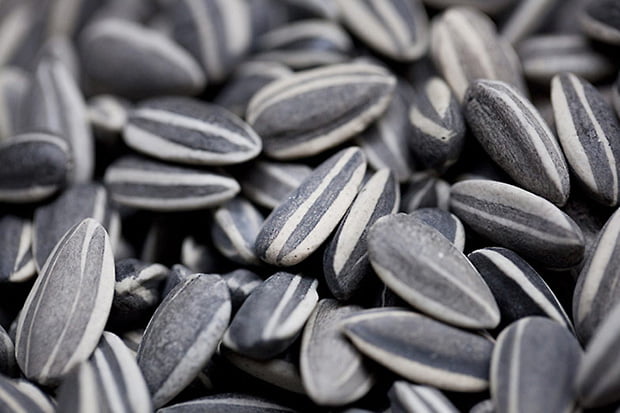The sunflower is one of the oldest plants on the American continent. Even 5000 years ago, Indians from Peru and Mexico produced this food. Sunflower can be consumed in the form of oil and butter, but we most often use it in the form of seeds. Sunflower seeds have been known since ancient times for their healing properties and beneficial effect on the blood flow, heart, nervous system and the whole body in general.
Below you can find out more about sunflower seeds, their nutritional value, composition and healing properties.

Nutritional value
Although they are very medicinal and contain many useful ingredients, sunflower seeds should still be consumed in moderation. They have a high nutritional value and are high-calorie foods, so they have as many as 584 calories per 100 g. It is recommended that you eat a handful of sunflower seeds a day, i.e. around 30 grams. That amount is quite enough and will provide you with the nutrients and energy you need. Considering that it is most often consumed as a snack while watching TV, it can happen that we unknowingly eat large amounts of seeds.
Now that you know how many calories they have, you should limit their intake, because in excessive amounts, sunflower seeds can lead to weight gain. If you are on a diet, do not consume these seeds or take them in very small amounts, no more than twenty grams per day. A handful of sunflower seeds is enough to satisfy your hunger and prevent you from reaching for some unhealthy snacks.
Composition
Thanks to its composition, sunflower has a healing effect. First of all, it is rich in B complex vitamins, vitamin E, beta carotene and vitamin B6. Research has shown that just one tablespoon of sunflower during the day is enough to provide the daily recommended dose of vitamin E. The most minerals are copper, magnesium, selenium, zinc, manganese, potassium and phosphorus. Only 30 g of sunflower seeds during the day provides us with half of the recommended daily dose of copper. Then, 20% of sunflowers are proteins, so by consuming sunflowers, our body is supplied with essential fatty acids that it needs for proper functioning.
Sunflower also contains fats, ie polyunsaturated fatty acids, such as oleic acid. It also contains phytosterols and dietary fiber.
Medicine
Sunflower belongs to the so-called superfood and is classified among foods that have an anti-cancer effect. In traditional medicine, sunflower seeds have long been used to treat arthritis and rheumatism and to strengthen eyesight. It has been proven that nibbling these seeds is beneficial for the functioning of the nervous system and can help patients suffering from multiple sclerosis. Thanks to the phytosterol it contains, sunflower lowers the level of bad cholesterol in the blood.
Also, sunflower is good for the treatment of cardiovascular and malignant diseases, because it contains large amounts of selenium and vitamin E. Sunflower seeds also improve digestion, so if you consume them regularly, you will no longer have problems with constipation and bloating. Sunflower is also good for dry and dehydrated skin or skin affected by eczema, because it provides the necessary moisture and protects it from external influences, thanks to proteins, vitamin E and linoleic fatty acid. Sunflower is the ideal food for you if you are often exposed to stressful situations. Namely, vitamin E from sunflower relieves stress and nervousness, and at the same time improves cognitive functions. Thanks to their antioxidant effect, sunflower seeds slow down the aging process and improve the blood count. Regular consumption of these seeds improves the blood count and improves circulation in the entire body. Thanks to the copper they contain, sunflower seeds provide a beautiful complexion to the skin and protect it from harmful ultraviolet radiation. Doctors in some countries recommend always keeping a bowl of lightly toasted sunflower seeds on the table.
Sunflower is most often consumed as a salty snack, and one of the options is to toast it in a dry pan. It is tastiest when it is lightly fried, but before frying, the sunflower should be well peeled and all damaged seeds should be removed. In addition, you can add sunflower to yogurt, muesli or sprinkle it on a salad. You can also add sunflower to rice and polenta. It is best to soak sunflower seeds in water and let them sit overnight, then add them to soup or broth. In combination with pumpkin, flax or sesame seeds, sunflower can be used to make homemade bread. In addition, if you chop sunflower seeds, you can make a delicious pizza topping out of them.
Also, baked eggs will be much tastier if you sprinkle sunflower seeds on them. Sunflower seeds should be kept in a closed container, in a dark and dry place.